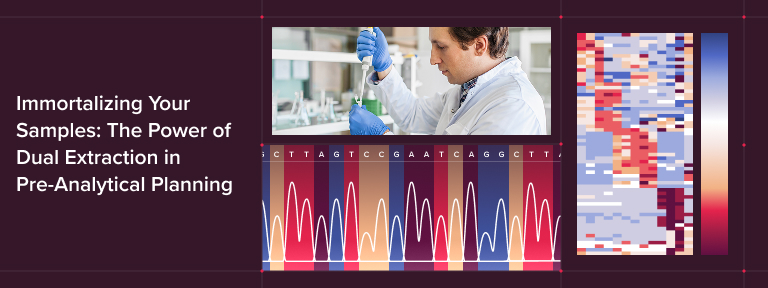August 18, 2025
The value of pre-analytical processes
How samples are initially handled, stored, and utilized can determine how much they are able to contribute to a study later down the line, particularly in longitudinal studies where samples may need to be revisited across multiple timepoints or analyses.
Yet pre-analytical processes, such as sample accessioning and processing, are often regarded simply as technical necessities rather than strategic opportunities to extend sample utility. When done thoughtfully, pre-analytical processes can add significant value, helping teams get more data from less material while preserving data quality.
How early sample management decisions shape long-term success
After a sample is collected, its value depends on the decisions made next. Accessioning, storage, and processing steps each influence how much insight can be generated from a sample, and how consistently, across the course of a study.
During sample accessioning, standardized intake and documentation are key to ensure traceability across sites and timepoints. From there, storage methods must align with both immediate and long-term analysis goals. If these steps aren’t carefully managed, samples may be mislabeled, mishandled, or stored incorrectly, all of which could compromise stability and impact their downstream applications.
If genomic analysis is expected at any stage of the study, it is vital that this is also taken into account at the pre-analytical planning stage. Building it into the sample strategy early can help to maximize the value of each sample and avoid missed opportunities for insight.
DNA/RNA extraction is a pre-analytical step that lays the foundation for reliable downstream analysis by preserving nucleic acid quality and yield, both essential for generating robust molecular data. It is also important to capture molecular quality control (QC) metrics and metadata at this stage to support data integrity and traceability.
However, given the limited availability of patient samples, many teams are hesitant to perform DNA/RNA extraction, and when they do, it’s often done cautiously, extracting DNA and RNA separately out of concern of compromising data quality. In doing so, they may consume more of the sample than necessary, limiting what can be done later in the study.
Optimized and validated dual DNA/RNA extraction, however, can overcome these challenges. Co-extraction techniques can enable high-quality extraction of both analytes from a single sample, reducing material consumption without compromising data quality. More of the original tissue or sample is preserved for future testing, while both DNA and RNA are made available for downstream analysis.
With a validated co-extraction approach in place, and with a CRO partner that has deep sample management expertise, you can gain valuable genomic insights while preserving sample integrity for use throughout the study lifecycle.
Dual Extraction: Get more from your slides
Dual extraction of DNA/RNA generates rich genomic data, immortalizing sample value for use across future analyses.
At CellCarta, we offer dual DNA/RNA tissue extraction supported by pathologists, who are able to calculate the exact number of slides needed to achieve target yields. Using this method, we can reduce the amount of sample required for extraction, so you can be sure that tissue is being used as efficiently as possible and is preserved for future analysis.
Validation data (Figure 1) shows that our dual extraction method achieves yields comparable to single-analyte extraction kits, demonstrating that high performance can be achieved with less material.

Figure 1: Yield metrics for DNA and RNA extraction from 4 μm and 5 μm slides, using standard single-analyte kits vs. CellCarta’s dual extraction method (Allprep)
By minimizing sample consumption while maintaining quality, dual extraction enables more from every slide and helps teams carry sample value further through the study.
Speak to one of our experts to find out more about how our dual extraction method can support your next project.
Trusted, end-to-end sample management
Alongside our dual extraction offering, CellCarta’s meticulous sample management and logistics services are designed to protect sample integrity at every step and keep trials running smoothly. We provide:
- Proven expertise with limited-stability samples; with our expert transport management services, we ensure sample shipping within 24 hours, achieving a 100% on-time study setup
- Global sample shipping, with capabilities to support trial locations spanning North and South America, Europe, Africa, Asia, and Australia
- Real-time tracking and reconciliation for full chain-of-custody visibility
- Dedicated project managers offering personalized oversight from study startup to final analysis
Governed by our robust quality management system, CellCarta helps ensure every sample is moved quickly, reliably, and with full traceability across every stage of your study, so you can get the quality data you need.
Looking to strengthen your pre-analytical strategy? Contact our team to find out how we can support your next study.
You might also be interested by
CellTalk Blog
Leveraging Preclinical Genomic Insights for Successful Therapeutic Development
August 18, 2025
Genomics
More infoCellTalk Blog
Maximize Sample Value with Combined IHC and RNAseq Analysis
August 18, 2025
Genomics
More infoWeb News
Biofidelity and CellCarta partner to deploy Aspyre® Lung in global clinical trials
January 9, 2025
Genomics
More infoCellTalk Blog
How can HLA typing drive better immunotherapy development and selection?
December 6, 2023
Genomics
More info